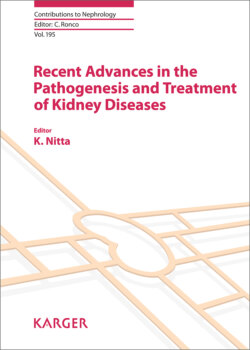Читать книгу Recent Advances in the Pathogenesis and Treatment of Kidney Diseases - Группа авторов - Страница 24
На сайте Литреса книга снята с продажи.
Single-Dose Rituximab Therapy for Steroid-Dependent MCNS
ОглавлениеKidney Disease Improving Global Outcomes guidelines recommended the usage of steroids to induce remission in adults with MCNS [13]. However, the evidence for this comes from small randomized controlled trials (RCTs) and observational studies in adults. The recommended dosage of steroids is 1 mg/kg/day for 4–16 weeks, tapered slowly over 6 months. For patients with frequent relapses and steroid resistance, Kidney Disease Improving Global Outcomes guidelines suggest alkylating agents (oral cyclophosphamide 2–2.5 mg/kg/day for 8 weeks). If there are contraindications for alkylating agents, calcineurin inhibitors could be used.
In adults, 2 retrospective analyses described patients with steroid-dependent or frequently relapsing MCNS despite immunosuppressive therapy treated with rituximab [14, 15]. Both case series found an increase in remission in about 60% of patients. We have shown that the first prospective cohort study compared rituximab treatment in 25 patients with steroid-dependent and frequently relapsing MCNS to historical controls and confirmed reduction of relapses in adults with MCNS [16]. As shown in Figure 3, a single dose of rituximab (375 mg/m2; max 500 mg) was administered 4 times every 6 months. For the first 6 months from the first dose of rituximab, the dosage of steroid and immunosuppressants were reduced each month and stopped. Rules for dose reduction of immunosuppressants: steroid reduction by 10 mg every month to discontinuation followed by cyclosporine reduction and discontinuation or Mizoribine reduction and discontinuation. This order can be changed according to the onset of adverse drug effects. A significant reduction in the number of relapses and the total dose and the maintenance dose of steroids administered was observed during the 12-month period after the first rituximab infusion. Complete remission was achieved in all patients undergoing B-cell depletion. A follow-up study to this prospective cohort study showed 8 relapses in 24 months after complete remission compared to 108 episodes in 24 months before rituximab [17]. However, complete remission was maintained in all 20 patients in the rituximab continuation group during the 12-month observation period after the first 4 rituximab infusions. Thus, rituximab may be considered as a radical therapeutic agent for adult patients with MCNS. No RCTs in adults have been conducted comparing rituximab treatment in either frequently relapsing or steroid-dependent patients or as a first-line therapy of MCNS.
Fig. 3. Study protocol of rituximab treatment to reduce the dose of immunosuppressants in steroid-dependent minimal change nephrotic syndrome.
